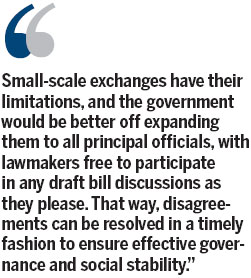Support govt's reform plan
Updated: 2013-11-22 07:22
By Cheung Hok-sau(HK Edition)
|
|||||||||
Opposition members of the Legislative Council (LegCo) tabled a motion earlier this month trying to invoke the Powers and Privileges Ordinance (PPO) to force the government to reveal details of the process of granting free-to-air TV broadcast licenses. The move sparked a round of heated debate among the public as well as political parties. This is another example of politicians attempting to undermine the executive-led government structure, which is protected by the Basic Law, using civil justice as an excuse. The motion was narrowly defeated in a LegCo vote but, nevertheless, it sounded an alarm for the government, the LegCo and the general public. Had the motion been passed, it would have blown the door wide open for more of such demands and destroyed the code of confidentiality of the Executive Council (ExCo) by forcing it to disclose top-secret government information. That would bring immeasurable damage to Hong Kong's long-term interests.
During the colonial era, the Hong Kong government was run by officials appointed from top down, while the administration's executive and legislative branches were under the control of the UK. However, since the addition of elected seats in the LegCo, the political ecosystem has changed dramatically. After the handover, the Basic Law ensures that the government structure is kept with the executive branch taking charge and LegCo playing the role of checking and balancing the system as well as that of a collaborator. That's why nobody should be surprised by constant differences and even head-butting between the executive and legislative branches nowadays. They are natural fruits of the executive-led administration with the legislature counterbalancing and supervising it. It also comes with the necessity to build a system of effective communication between the two branches that will facilitate the HKSAR government's operations as smoothly and efficiently as possible. This is the most important task for each and every SAR government down the road.
Ronald Reagan was considered exceptionally skillful in handling the relationship between the White House and Congress when he was the US president. He successfully persuaded the Congress to approve some very significant pieces of legislation, such as huge tax cuts and increased defense spending. Back then, the "legislative strategy team" played a critical role in the process. That group was headed by the White House chief of staff and boasted several top presidential aides as lobbyists to talk to lawmakers whenever and wherever necessary about various bills the federal government intended to introduce and seek congressional support for them.

The fact is Hong Kong has a similar mechanism of its own, but it's not as extensive or assertive as that of the US. When the SAR government conceptualizes a policy, it will discuss the rationale of certain details of the new policy with LegCo members through relevant bills committees and collect feedback and build a consensus. This is a very good form of advance communication and should be applied to all draft bills. In addition, Chief Secretary for Administration Carrie Lam Cheng Yuet-ngor holds weekly meetings with the chairperson and vice-chairpersons of the House Committee of the LegCo to ensure that communication between the executive and legislative branches of the government is in place. This is another good start.
However, I believe that small-scale exchanges like these have their limitations, and the government would be better off expanding them to all principal officials, with lawmakers free to participate in any draft bill discussions as they please. That way, disagreements can be resolved in a timely fashion to ensure effective governance and social stability.
Political stability is a prerequisite for economic development. Hong Kong should not waste so much time on political squabbling if it wants to maintain stability and development, which is what local residents need most for a better livelihood. In the current LegCo, there are 43 pro-establishment members, who hold a relative edge over the opposition and can secure the passage of any government bill if they can win over four moderate lawmakers to secure an above two-thirds majority. Thus, the key to success lies in absolute unity of the pro-establishment legislators by putting their personal interests aside and building consensus solely on public will, with an eye on the overall interest of society.
Public consultations on the government's plan for the 2017 Chief Executive election by universal suffrage will begin by the end of this year. It's no exaggeration calling it another milestone in the city's democratic development that's crucial to the smooth implementation of the Basic Law, the success of "One Country, Two Systems" as well as Hong Kong's continued prosperity and stability. Members of the public, therefore, have enormous expectations of pro-establishment LegCo members drawing a lesson from previous setbacks, joining hands to ensure that constitutional reform will proceed within the confines of the Basic Law and relevant decisions of the National People's Congress Standing Committee, and fighting against meddling by foreign forces and sabotage by local parties with ulterior motives.
The author is a Hong Kong member of the CPPCC and vice-chairman of the Hong Kong Chinese Importers' & Exporters' Association.
(HK Edition 11/22/2013 page9)